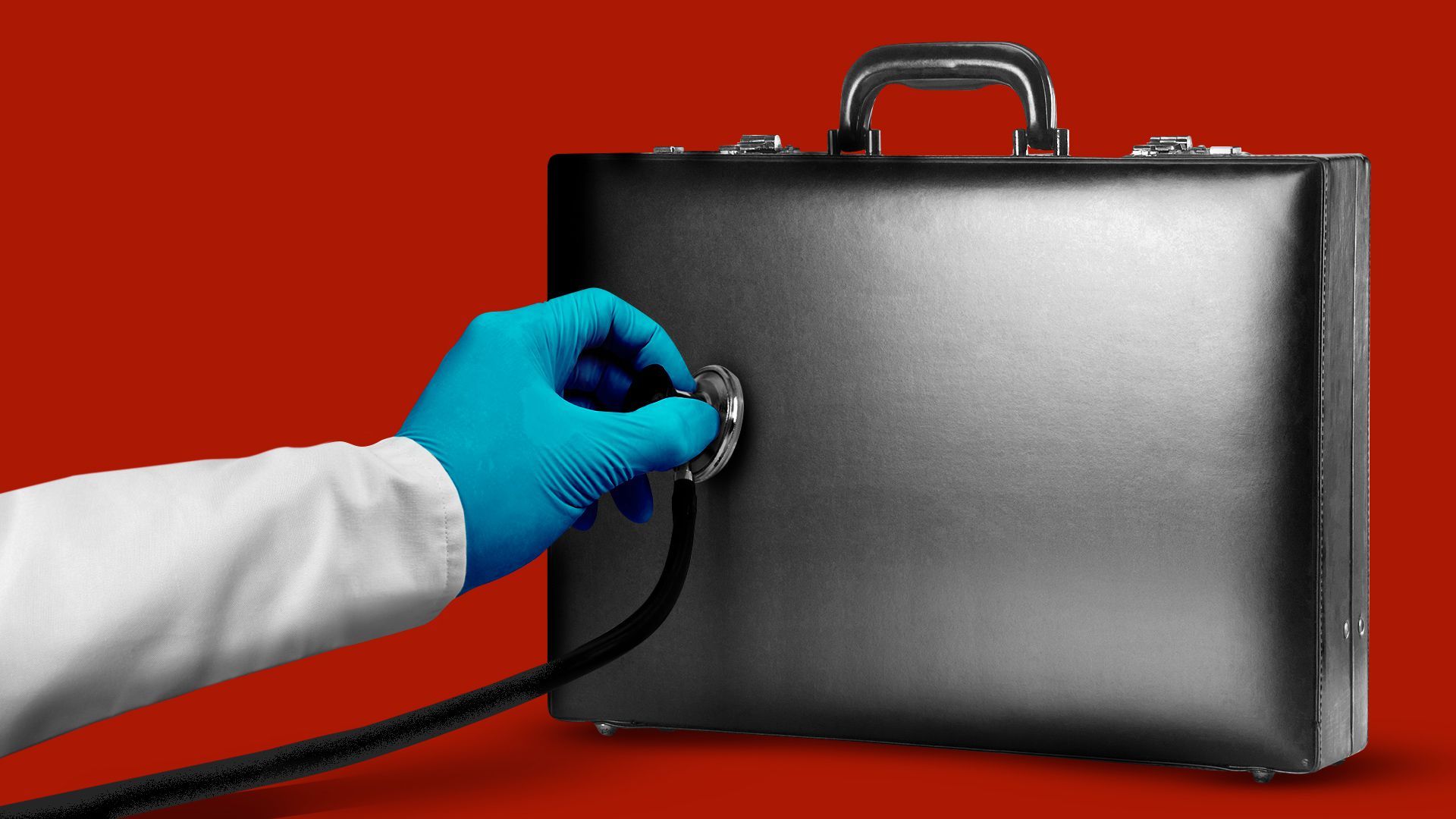Plus, Health inequities plague work-based coverage | Monday, July 25, 2022
| | | | | | | Presented By Pharmaceutical Care Management Association | | | | Axios Vitals | | By Adriel Bettelheim · Jul 25, 2022 | | Happy Monday, Vitals fam. I'm filling in for Tina, who's out this week. Today's newsletter is 917 words or a 3-minute read. | | | | | | 1 big thing: Democrats' high-stakes math game |  | | | Illustration: Aïda Amer/Axios | | | | Democrats entering a crucial week in their bid to pass a huge health care bill without Republican votes have yet to decide how to target hundreds of billions of dollars in spending — a call heavily dependent on politics and Senate rules, Axios' Caitlin Owens writes. Why it matters: The party seems willing to do whatever it takes to lower prescription drug prices and prevent massive Affordable Care Act premium hikes in the fall. What else can be added depends on how much money is available and how much of that Sen. Joe Manchin (D-W.Va.) is willing to spend. The big picture: This is the closest that Democrats have come yet to allowing Medicare to negotiate drug prices, a goal the party has had for decades. - But the reconciliation measure being considered has gone from a huge catch-all package of domestic policy priorities to a watered-down version of just the health care portions of last year's legislation, which is all Manchin has said he'll accept for now.
- Passing something now is obviously much better for Democrats than doing nothing before the midterm elections, and it's widely understood that no one wants to upset what is already a very delicate balance.
- The coming days will likely reveal whether there's any wiggle room for some party priorities to be slipped in.
What we're watching: The Senate parliamentarian is expected to rule this week on whether the legislation complies with reconciliation rules, and analysts say she could strike some major drug pricing components. - Once there's a ruling, Democrats will know how much money they're working with. But they'll still need to figure out how much of that Manchin is willing to spend.
- Money for COVID-19 countermeasures and women's health funding in response to the overturning of Roe v. Wade could be on the table.
The bottom line: Democrats want to pass a big health care bill before they leave town for most of August. No one knows how big it will be. Go deeper. |     | | | | | | 2. Health inequities eat into work-based coverage |  | | | Illustration: Aïda Amer/Axios | | | | The more than 150 million Americans who get their health coverage through work face significant inequities by race and ethnicity while managing complex health conditions, a new analysis from Morgan Health and NORC at the University of Chicago finds. Why it matters: While there's a perception that employer-sponsored insurance delivers robust coverage, researchers found major gaps in access to care and chronic disease management. What they found: Black enrollees in employer-sponsored plans were almost 17 percentage points likelier to have high blood pressure than white enrollees, after adjusting for age and sex. - The rate of undiagnosed diabetes was about 3 percentage points higher for Asian, Hispanic and Black enrollees than for white enrollees.
- Black, Asian and Hispanic enrollees with low-risk pregnancies were more likely to undergo a cesarean section, which can increase the risk of infections, blood clots and other complications.
- Black enrollees were 4.9 percentage points more likely than white enrollees to have visited an emergency department — often a sign of less accessible care.
The bottom line: Health inequities aren't confined to Medicare, Medicaid or uninsured populations but are present within major employers' workforces. Go deeper. |     | | | | | | 3. Fertility care investors cautiously optimistic | | Though the demise of Roe v. Wade has introduced a new layer of uncertainty surrounding fertility treatments, investor interest in IVF services remains robust, Axios' Sarah Pringle writes. Zoom in: With a cash- and commercial-payer base, fertility historically has been deemed lower-risk by many investors from a reimbursement and regulatory perspective than medical specialties that depend on Medicare or Medicaid reimbursement. State of play: Private equity investors own those fertility businesses with any scale. - Consider Lee Equity's Inception Fertility, Amulet Capital's US Fertility, Webster Equity Partners' Pinnacle Fertility, Morgan Stanley Capital Partners' Ovation Fertility and InTandem Capital's Ivy Fertility. Plus, KKR-owned Spanish giant Ivirma has a U.S. presence.
The big question: If some states developing post-Roe abortion bans ultimately decide that personhood begins at the creation of an embryo — making it illegal to discard embryos that are not fertilized — what will investors with clinics in those states do? - There are operational workarounds being explored (i.e., inseminate in one place, implant in another). That hypothetically might not require clinics to relocate but could increase costs.
- But IVF interests like the American Society for Reproductive Medicine are trying to persuade red state legislatures to adopt language that would explicitly exempt the procedure from trigger laws that ban or restrict abortion.
|     | | | | | | A message from Pharmaceutical Care Management Association | | PBMs support lower insulin costs for patients | | |  | | | | Drug manufacturers alone set insulin prices. The INSULIN Act is a windfall for Big Pharma and will inflate insulin costs by $23 billion for the federal government and billions more for state governments and the health care system. Learn more about PBM's efforts to lower patients' insulin costs. | | | | | | 4. Quote du jour | | "People will very rapidly spit into a cup and send it to 23andMe and get really interesting data about their background — and guess what? Their DNA is now owned by a private company. It can be sold off ... with very little intellectual property protection or privacy protection, and we don't have legal and regulatory regimes that deal with that. ... That data is actually going to be procured and collected by our adversaries for the development of these systems." — Rep. Jason Crow (D-Colo.) warning the Aspen Security Forum about biological weapons designed to target specific people based on their genetic profiles. |     | | | | | | 5. While you were weekending |  | | | Illustration: Aïda Amer/Axios | | | | Monkeypox was declared a global emergency by the World Health Organization, which could lead to more investment in treating the disease. (Axios) A pitched battle is underway in Kansas around the first state constitutional amendment on abortion since Roe was overturned. (Washington Post) An investigation finds signs of fabrications in scores of Alzheimer's studies, threatening a leading theory about the disease. (Science) About 6% of children seen in emergency departments for COVID-19 were found to still have symptoms 90 days later. (JAMA Network Open) |     | | | | | | A message from Pharmaceutical Care Management Association | | PBMs support lower insulin costs for patients | | |  | | | | Drug manufacturers alone set insulin prices. The INSULIN Act is a windfall for Big Pharma and will inflate insulin costs by $23 billion for the federal government and billions more for state governments and the health care system. Learn more about PBM's efforts to lower patients' insulin costs. | | |  | | Why stop here? Let's go Pro. | | | | | | Axios thanks our partners for supporting our newsletters. If you're interested in advertising, learn more here.
Sponsorship has no influence on editorial content. Axios, 3100 Clarendon Blvd, Arlington VA 22201 | | | You received this email because you signed up for newsletters from Axios.
Change your preferences or unsubscribe here. | | | Was this email forwarded to you?
Sign up now to get Axios in your inbox. | | | | Follow Axios on social media:    | | | | | |







No comments:
Post a Comment